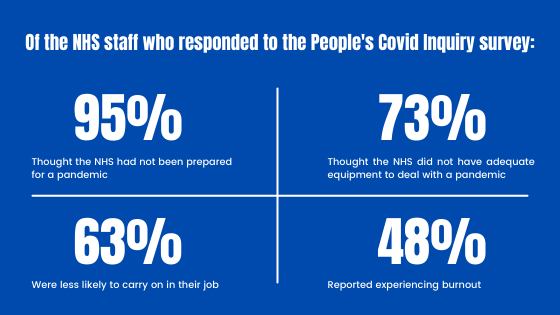
The People’s Covid Inquiry has been hearing your stories and experiences of COVID-19, to gather evidence from as many people as possible about the personal impact of the pandemic on our health, work and wellbeing.
Across the nine inquiry sessions, the panel heard from a wide range of witnesses, from professors of public health to frontline NHS staff and more. However, nine sessions only offered a limited amount of time to hear the experiences of people who lived through it, and we wanted this Inquiry to be as far reaching as possible, and to reflect the fact that everyone in the UK has had a unique and varied experience of the COVID-19 pandemic.
With this in mind, Keep Our NHS Public launched a public survey, which ran alongside the Inquiry.
1670 people completed the survey between February and June, and shared a broad range of experiences of the pandemic.
What has been revealed?
We asked the general public, NHS staff, pupils and parents of pupils what their experiences of the pandemic had been. We found that nearly nine out of ten (89%) people surveyed think the Government’s timings of the lockdowns led to higher numbers of deaths and infections, which we have subsequently learnt to be true from one of our Inquiry witnesses, Professor Anthony Costello.
We also found over two thirds, 67%, of people felt that the Government’s messaging made it unclear or very unclear as to what we were meant to do in each lockdown period and 82% thought that all regions have not been treated equally with regards to the pandemic. Overall, 95% of our respondents rated the Government's handling of the pandemic as poor or very poor.
The impact of lockdowns on our respondents was significant, with two thirds (66%) of people saying covid restrictions impacted their lives extremely or a lot during the three lockdowns (March 2020, November 2020 and from late December 2020). Despite this, nearly three quarters, 73% of people found restrictions of social life and social interactions not nearly severe enough or somewhat not severe enough.
With regards to schools, over three quarters, 76% of people, found restrictions of schools not nearly severe enough or somewhat not severe enough.
We have heard repeatedly from witnesses in the inquiry that the NHS has been undermined in favour of the private healthcare sector throughout the pandemic. Nearly nine in ten responders (86%) in our survey had a ‘very negative’ view of the government's decision to outsource aspects of the pandemic response to private healthcare firms. Three out of five (62%) of respondents, said the health services in their region did not have the adequate equipment or resources to cope with the pandemic.
Out of the NHS workers who responded, 95% of staff said the NHS was not well prepared to cope with a major pandemic and 73% said the NHS did not have adequate equipment to deal with the crisis. Nearly half, 48% said they had experienced burnout in the past year and 63% reported they were less likely to carry on in their job after the experiences of working within the NHS during the pandemic.
One NHS worker told us:
“[The Pandemic] has reinforced the feeling that as a nurse, I am just a number outside of my direct department. I feel that the government's appreciation for all of the extra hours of work, and personal and professional sacrifices we have made, is empty. The recent announcement regarding the proposed 1% pay rise for NHS staff only confirms this, and really does feel like a slap in the face. I have borne witness to some terrible suffering that I will never forget.”
Of the parents of school age children who responded to us, 86% reported that the Government’s handling of school closures negatively or very negatively. Over a third, 38% of parents felt their children’s school environment had been very unsafe or unsafe throughout the pandemic and nearly half (49.5%) felt that their children going to school had an adverse impact on the safety of their household overall.
One student responding to the survey told us:
“The government continued to change the advice given which in turn made me feel more endangered from the virus and also impacted my mental health and ultimately my family's physical health.”
Nearly three quarters (74%) of parents of children of school age thought teachers had not been adequately supported to adapt during the pandemic.
One parent told us : “My daughter has been left with more mental health issues and will not leave the house due to severe anxiety, there is no support in place for these children as all are still closed and waiting times for Child and Adolescent Mental Health Services (CAMHS) is 18 months, this is unacceptable.”
What's next
The evidence-gathering sessions for the People's Covid Inquiry have now ended and we are working on a report of the findings.
You can watch the evidence collecting sessions on YouTube and find out more on the People's Covid Inquiry website.







Leave a Reply